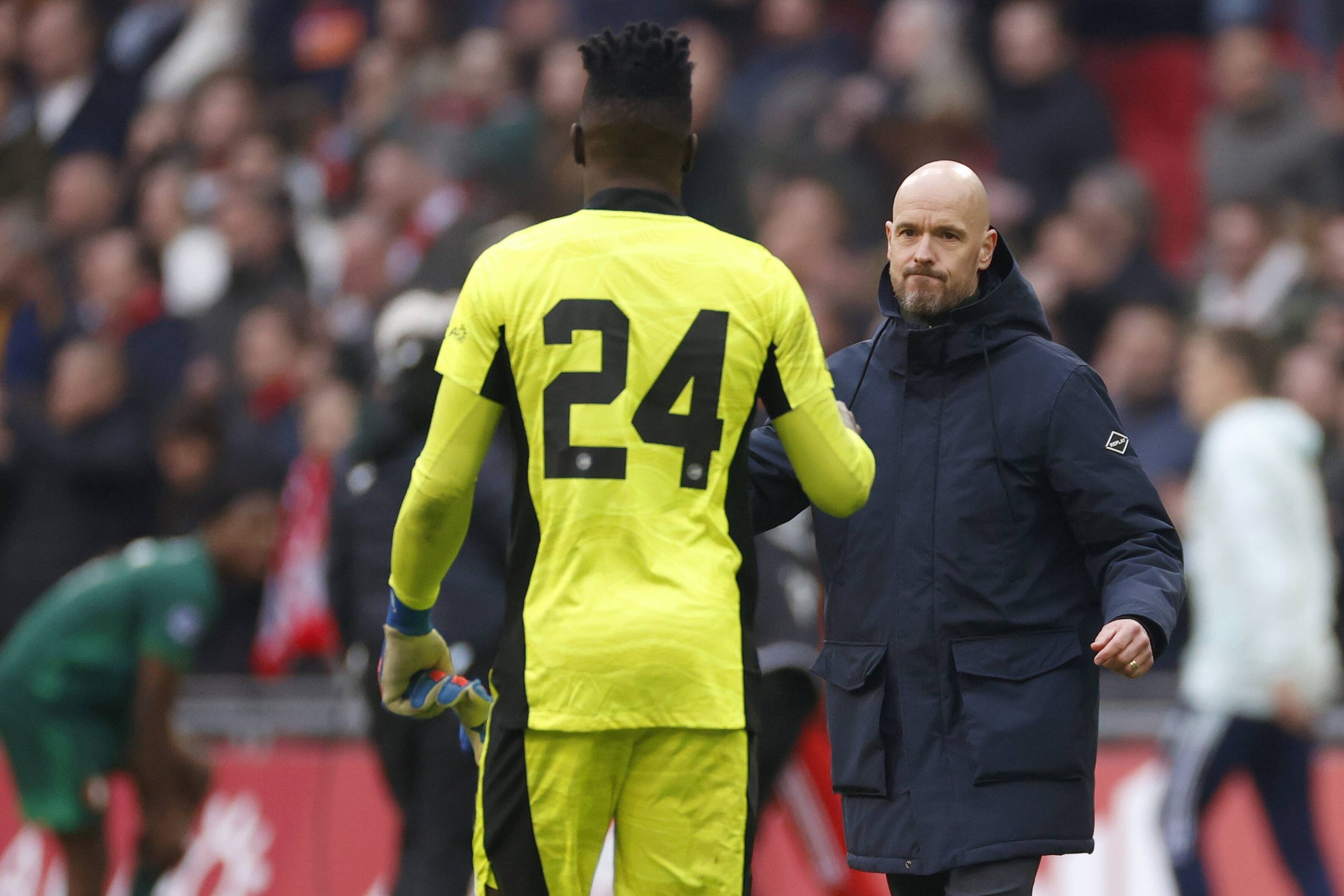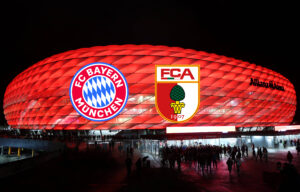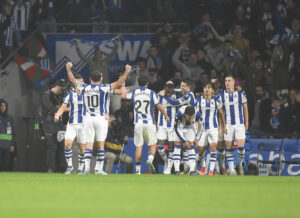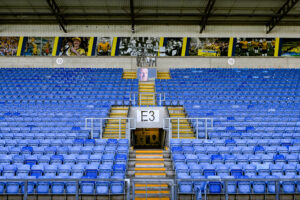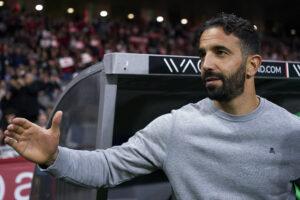Manchester United goalkeeper Andre Onana made an admirable decision after his side’s 4-3 loss to Bayern Munich on Wednesday night to accept responsibility for the loss at the Allianz Arena. While the leadership shown by the Cameroon international set a great example for his teammates, it masks the harsher truths of why Erik ten Hag’s team continues to struggle.
[metabet_core_side_odds_tile query=”soccer_game_player_score_goal_first/536595″ size=”350×300″ style=”fraction” site_id=”lastwordonsports”]
Why Man Utd’s Problems Go Beyond Individual Errors
Andre Onana Accepts Responsibility for Defeat to Bayern Munich
The Red Devils started well against the Bundesliga champions in Wednesday’s UEFA Champions League group stage tie, until an error by their goalkeeper saw Leroy Sane’s tame effort on goal palmed into the bottom corner of the net.
From there, the performance became frantic, although the Reds can feel aggrieved that a harsh handball decision against Christian Eriksen gave the German side a penalty, which Harry Kane made no mistake with, restoring Bayern’s lead after Rasmus Hojlund’s equaliser.
Watch: What Manchester United Need to Learn from Brighton’s Success
Despite a flurry of late, and frankly, strange goals with – the exception of Mathys Tel’s wonderful strike for Bayern’s fourth – United’s hopes of a comeback were spoiled swiftly.
After the game, Onana reportedly demanded to perform post-match media duties. In his interviews, he took it upon himself to accept the blame for the loss, despite his captain Bruno Fernandes refuting any suggestion that the responsibility for the result was at his door.
Read More: ‘Should Be a Lot Better’: Manchester United Club Legend Demands More From Current Squad
Man Utd Keeper: ‘If We Didn’t Win, it’s Because of Me’
Speaking after the game, the United keeper said:
“This is the life of a goalkeeper. It’s difficult. We started very good. After my mistake we lost control of the game. It’s a difficult situation for us, for me especially because I’m the one who let the team down.
“We were very good on the ball, they didn’t create any chances, their first shot on target I made a mistake. It was the key point and the team went down because of that mistake.
“If we didn’t win today it was because of me.
“I have to learn from it and be strong. I have a lot to prove. My start in Manchester hasn’t been so good, not how I want. This was one of my worst games.”
Ten Hag’s Two Victories Flatter Poor Performances
While it is true that the Premier League side had moments of promise before their shot-stopper’s critical error in the 28th minute, their overall performance was not out of character from their previous form. United currently sit in 13th place in the Premier League table after picking up six points from their opening five matches and their two victories of the season were hardly comprehensive.
In their most recent victory, they came out 3-2 winners to a Nottingham Forest side down to ten men. Steve Cooper’s side had miraculously found themselves two goals ahead within five minutes. But by full-time, Bruno Fernandes had completed his side’s comeback from the penalty spot after a controversial decision.
On the opening night of the 2023/24 campaign, United struggled against a Wolves side predicted by many to be relegated after a tumultuous pre-season. In the summer, their previous manager Julen Lopetegui resigned and key players were sold amid Financial Fair Play concerns.
Even the most pessimistic fans would have failed to predict that their side would have eight fewer shots than their opponents (15 to 23) and a close to even split of possession (51% to 49%).
A late, incorrect call to not award a penalty against Onana for a clash in the box was also crucial in securing the three points. The decision was judged to be so poor that the matchday officials were suspended from Premier League duties.
Read More: ‘My Understanding’: Fabrizio Romano Reveals Man Utd Could Make Major January Signing
Man Utd’s Confused Identity Hidden by Individual Errors
The primary source of United’s problems comes from a clash of identity between the defence and midfield, with the former built for slower-tempo possession football, and the latter for direct attacks at break-neck speed.
First, the recruitment in recent years has moved towards players suited to a more modern, patient and gradual build-up from defence. This was harder to see with David De Gea, who looked extremely uncomfortable with the ball at his feet.
However, the introduction of Andre Onana and his specialist abilities on the ball has instilled confidence in the rest of the backline to invite attackers to press in order to play out of the back.
The midfield, however, much of which has been rebuilt under their current manager, is in conflict with this desire for possession-based football. Fernandes is an extremely capable playmaker, but after several years of playing transitional football, he looks frustrated and impatient in slower phases of play.
Casemiro is comfortable in most systems, but a £70 million move last season for a then-30-year-old is beginning to look questionable.
On the left, Marcus Rashford is renowned for his excellence in counter-attacks and ability to force quick moves but appears to find it challenging to stay involved when the game is slowed down. Right winger Antony, currently sidelined for off-field issues, has not shown the presence on the ball that fans had hoped for after his £82 million move from Ajax.
In 43 games in all competitions, the Brazilian has only recorded seven goals and two assists so far in his career at Old Trafford.
Ten Hag Must Be Decisive to Protect His Man Utd Role
Overall, the personnel and playstyle on display so far this season paint a picture of a side split into two diametrically opposed tactical approaches. The defensive five, led by Onana, are committed to tidy and patient ball progression. Meanwhile, Ten Hag and the midfield he has assembled, want to attack directly and at incredible speed.
If the United boss hopes to turn around his fortunes, he must focus on defining his side’s playstyle and look past individual errors. Without it, he risks inviting the pressure, on and off the pitch, that will inevitably increase the number of mistakes made by his players.


